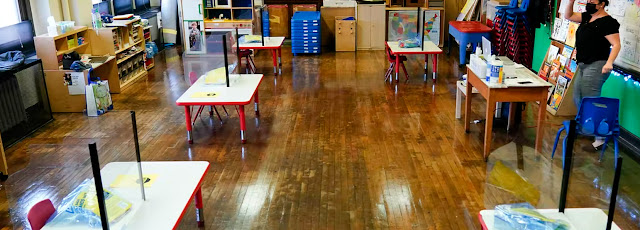 |
| A school in rural Pennsylvania during the pandemic (Associated Press photo by Matt Rourke, via The Conversation) |
Penn State professors wanted to see how schools in Pennsylvania's 235 rural districts fared in the pandemic, so they surveyed and interviewed rural superintendents, principals, teachers and parents. Their findings, which are likely echoed in most other rural communities: Rural schools already faced disparities in technology, broadband access, and teacher staffing before the pandemic, but it made things much worse, Gerald K. LeTendre and Peggy Schooling report for The Conversation, a site for journalism by academics.
"Over the more than two years of dealing with the pandemic, schools increasingly bore the brunt of the frustration local residents had with state or federal guidelines," LeTendre and Schooling report. One school leader even told them, "We went from being heroes to villains." LeTendre is an educational administration professor and Schooling is a professor of practice in educational leadership and the executive director of the Pennsylvania School Study Council.
Through focus groups, the researchers identified four phases in parent sentiment during the pandemic. In Phase 1 there was widespread concern about teacher and student wellbeing, and was marked by "rapid adaptation and improvisation," LeTendre and Schooling report. Phase 2 was about getting back to school and navigating the new rules of sharing classroom space. Common public sentiment in Phase 3, one participant said, held that "Teachers are no good and just do not want to work." And Phase 4, another participant said, devolved into people saying "You can’t make my kid wear a mask! I am the parent! Teachers are the devil!"
Many in rural communities were eager to return to normal by this spring, but there remains a deep divide between those who believe schools should return completely to pre-pandemic practices and those who want to continue to incorporate more technology into normal learning routines so as to be ready for future surges, LeTendre and Schooling report.
No comments:
Post a Comment